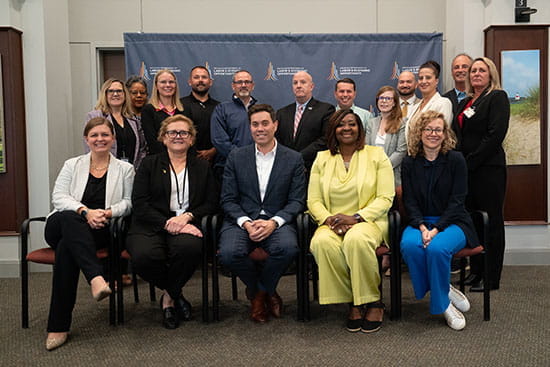The web Browser you are currently using is unsupported, and some features of this site may not work as intended. Please update to a modern browser such as Chrome, Firefox or Edge to experience all features Michigan.gov has to offer.
New initiative awards college credit for apprenticeships
October 21, 2025
LEO, State Workforce Development Board, MiLEAP, MCCA and building trade unions partner to award college credit for apprenticeship training, expanding career pathways for Michigan workers
Lansing, Mich. — The Michigan Department of Labor and Economic Opportunity (LEO) has launched a new initiative to award college credit to residents who complete building trades Registered Apprenticeship programs. LEO, the state’s skilled trades unions, the Michigan Department of Lifelong Education, Advancement, and Potential (MiLEAP) and the Michigan Community College Association (MCCA) will work together to build statewide accreditation agreements between the trades and community colleges to award college credit for registered apprenticeship training.
The College Credit for Apprenticeship initiative will allow apprentices to earn college credit for the rigorous, hands-on training they complete through their skilled trade programs statewide. These credits can then be applied toward an associate degree or technical certificate, helping apprentices continue their education, expand their career opportunities and increase their earning potential. This effort builds on existing local agreements between community colleges and trade unions that award credit for prior learning to ensure this opportunity is available to trades workers across the state.
“Registered Apprenticeships are a powerful way for Michigan workers to earn while they learn, gaining real-world skills and credentials,” said LEO Director Susan Corbin. “Now, with the College Credit for Apprenticeship initiative, apprentices can also earn college credit for their on-the-job training, opening doors to degrees and certifications that strengthen careers, support employers and continue building a skilled, adaptable workforce across Michigan.”
This initiative was created and launched in conjunction with the Michigan Workforce Development Board, a governor-appointed advisory body comprised of business, labor, workforce and education leaders that provides strategic leadership, oversight and recommendations to support a workforce that is innovative and aligned with the needs of employers and workers across every industry. The board also advances the Statewide Workforce Plan, which includes Gov. Whitmer’s Sixty by 30 goal to increase the number of working-age adults with a skill certificate or college degree to 60% by 2030.
"Awarding academic credit for Registered Apprenticeship students makes it more affordable and attainable for them to achieve a college degree or certificate, and ultimately, a well-paying career,” said Michigan Workforce Development Board Chair Jeff Donofrio. “This is another step on the right path to establishing more seamless connections between work experience and higher education - a path that will boost opportunities for students of all ages and backgrounds."
Through this initiative, the American Council on Education (ACE) will conduct third-party evaluations of apprenticeship curriculum, ensuring apprentices receive appropriate credit for their on-the-job learning. These evaluations come at no cost to unions or community colleges, while also protecting the integrity of proprietary curriculum.
“Granting college credit for apprenticeships is a major win for Michigan’s skilled trades. It expands career options and allows our trades workers to continue building skills over the course of their lifetime” said President of Michigan Building and Construction Trades Council Steve Claywell.
Michigan is a national leader in apprenticeships – ranking 4th in the country – with more than 24,000 active apprentices enrolled in over 800 programs. The College Credit for Apprenticeship initiative builds on this momentum by ensuring active apprentices and trades workers that previously completed apprenticeships can pursue additional credentials through efficient pathways without starting from scratch.
"Michigan’s community colleges are proud to partner in this initiative, which recognizes the value of hands-on, industry-driven training,” said MCCA President Brandy Johnson. “By awarding college credit for apprenticeship experience, we’re creating clear pathways for apprentices to further their education, gain additional skills, and advance their careers to build a stronger workforce and support local employers."
As an industry-driven, earn-while-you-learn training model, registered apprenticeships give workers paid, hands-on experience alongside classroom instruction, leading to a nationally recognized credential upon completion. Awarding credit for this on-the-job learning will create opportunities for apprentices to develop additional skills and advance their careers.
“MiLEAP is proud to work alongside our state partners to ensure every learner in Michigan has a clear pathway to reach their full potential,” said Dr. Beverly Walker-Griffea, MiLEAP director. “By strengthening our agreements with community colleges to recognize apprenticeship experience as college-level learning, we’re opening more doors for Michiganders to earn credentials, step into high-demand, good-paying jobs, and help move our state closer to reaching the governor’s Sixty by 30 goal.”
“This collaboration truly recognizes the incredible quality of Michigan’s building trades programs and the students who complete them,” said LEO Deputy Director of Labor Sean Egan. “Apprentices already learn through some of the most advanced, hands-on training in the country and the project ensures recognition toward college credit. It’s about valuing their skills, expanding opportunity and ensuring a pathway through the trades can lead to lifelong learning and a great career. This is a win for workers, for education and for Michigan’s future workforce.”
Michiganders and employers interested in exploring Registered Apprenticeships should visit Michigan.gov/Apprenticeship.

Media Contact: